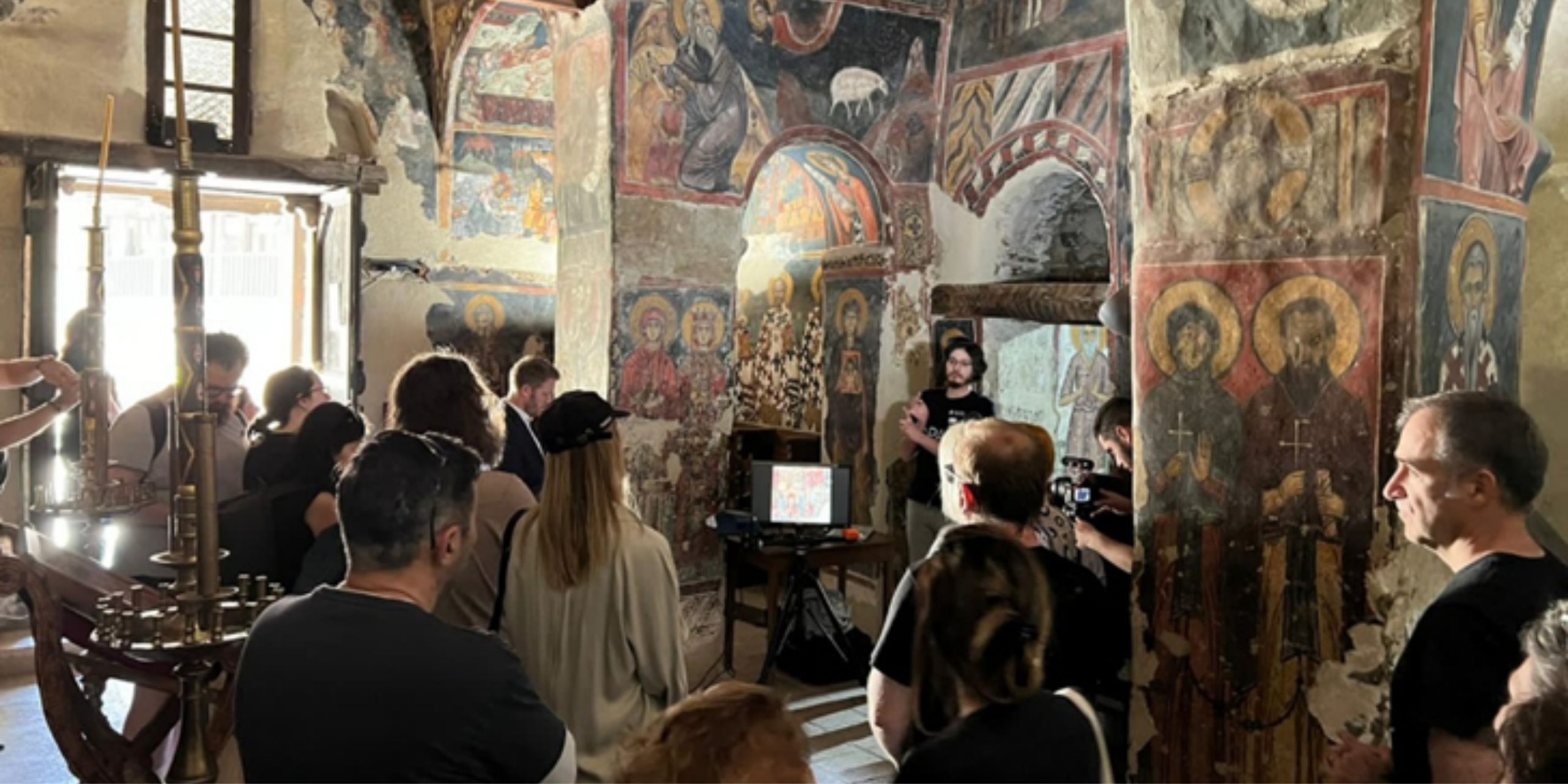On the occasion of the International Day of Monuments and Sites, 18th of April 2023, and in collaboration with the Department of Antiquities, the Bishopric of Morphou, the village of Kalopanagiotis and the British High Commission, CyI’s Andreas Pittas Art Characterization Laboratories (APAC Labs) organized a day-long event at the UNESCO world heritage site of the Monastery of St. John Lampadistis in the village of Kalopanagiotis. The “Tracing History at the Monastery of St. John Lampadistis” event was part of the broader program of APAC Labs events celebrating three years of operations.
Visitors were welcomed by the mayor of the village of Kalopanagiotis Mr. Lambrou, the British Deputy High Commissioner, Mr. Ben Rawlings, and STARC Director, Dr. Michel Menu. The Director of the Department of Antiquities, Dr. Marina Solomidou-Ieronymidou and the Metropolitan of Morphou Neophytos conveyed their greetings and support.
The event offered guided tours and focused presentations on the interdisciplinary research work pursued at the site by APAC Labs / STARC specialists and other experts. Throughout the monastic complex, specialists were on hand to provide spotlight presentations on the various studies APAC Labs has performed at the site. Assoc. Professor Nikolas Bakirtzis, introduced visitors to the history, the art and architecture of the Byzantine monastery.
Mia Gaia Trentin and Stelios Irakleous provided key insights into the studies of historic graffiti and Karamanli pilgrims at the monastery. Raphael Moreau, CyI PhD candidate, presented preliminary results of an ongoing multi-sensored analysis of wall paintings in the monastic church. Another PhD candidate, Mehmetcan Soyluoglu, introduced visitors to dendrochronological research and sampling of the site’s wooden heritage. Assoc. Professor Sorin Hermon and PhD candidate Luciarita Nunziata offered a look at the processes for capturing 3D data of the site and documenting environmental challenges and threats.
Finally, PhD student Nicolette Vollero Levy gave a tour of the Monastery’s icon museum, highlighting new information about icons revealed by APAC Labs’ technical analysis. Andriana Nikolaidou, Rahaf Orabi, Antonia Agapiou, Soodabeh Sajadi, Valentina Vassalo and Anastasia Tsanga contributed to the preparation and the organization of the successful event which was well attended by numerous groups of local and international visitors.
Working in collaboration with the Department of Antiquities, APAC Labs / STARC have been studying the rich heritage of the famous UNESCO-listed Painted Churches of the Troodos Mountains. Overall, there are ten church monuments included on the World Heritage List, all richly decorated with murals, providing an overview of Byzantine and post-Byzantine painting in Cyprus. These sites feature art and architecture that reflect the cultural life of Cyprus in the Byzantine and Medieval periods located at the crossroads of Mediterranean maritime connections and cultural exchanges between East and West. APAC Labs’ research provides a holistic approach to the documentation, analysis and preservation of these important monuments including a broad range of methods such as physico-chemical analysis of the materials used in the wall paintings and the icons of these churches, 3D documentation and visualization, dendrochronology, structural archaeology and the novel study of Medieval and Early Modern graffiti. Furthermore, the study of Byzantine and post-Byzantine monasticism and the complex role of pilgrimage, cult and ritual in the formation of cultural identity through time are central themes that provide the necessary context for the effective utilization of science and technology, like in the case of the Troodos churches.
Thanks to the generous support of Dr. Andreas Pittas, APAC Labs / STARC researchers have been developing task-specific service protocols related to material characterization and data integration, address issues of provenance, and assess the state of preservation of works of art, archaeological objects and monuments. The organization of the APAC day at Kalopanagiotis allowed the opportunity to share exciting research results and to promote the meaningful use of science and technology in the ways we study, preserve and understand the past and the precious cultural heritage of Cyprus.
The Cyprus Institute I News (https://bit.ly/3AmwtrW)
